#stigma of adopted sons
Explore tagged Tumblr posts
Text
Lovestuck Narrative: The Controversy Of Rasulullah With His Adopted Son's Wife
Introduction Typical tactic for the missionaries, Christians in general, and all the critics is to use this argument to portray how Rasulullah SAW lusted over his adopted son Zayd bin Harithah’s wife. According to them, this is immoral and Rasulullah’s teaching are driven by sexual desire some sort. Other than the marriage of Rasulullah with Aisha, this is the most used argument to diminish…
#abolishing adoption misconceptions#adoption in Islam#Allah#Apologetics#cultural norms in Islam#hadith#Islam#Islamic apologetics#Islamic family structure#Islamic lineage preservation#justice in Islamic rulings#marriage of Prophet Muhammad and Zaynab#marriage rulings in Islam#misconceptions about adoption#practical examples by Prophet Muhammad#pre-Islamic practices#quran#stigma of adopted sons#sunnah#Surah Al-Ahzab rulings#wisdom of divine commands#Zayd ibn Harithah
1 note
·
View note
Text
eunuch rating system: part 2 electric boogaloo! part 1 based on the original post by @welcometothejianghu wherein i continue to rate REAL historical chinese eunuchs! this is a non-exhaustive list and there's honestly no metric to it. i just pick the guys i like.
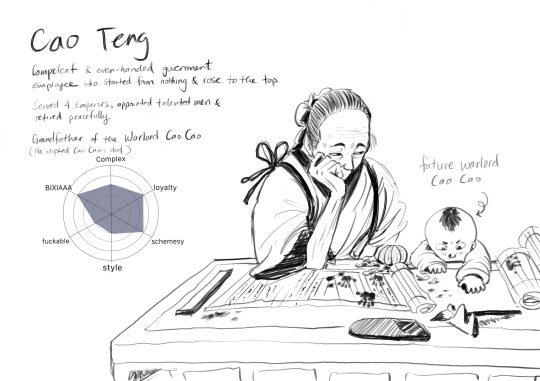
Han Dynasty (yes, again. the Han was like 400 years long lol) Cao Teng was a pretty normal guy whose biggest claim to fame is his extremely infamous grandson, Cao Cao. Because of this, Cao Teng is the only enunch in chinese history to get a royal title; Emperor Gao of Wei, which was granted posthumerously through Cao Cao’s grandson Cao Rui.
Cao Teng was a good judge of character who promoted a bunch of famous people, one of whom was a guy who had even tried to impeach him previously. After 30 years of service, he retired, got married, and adopted a son.
i decided to put him on the list because the common perception of the eunuch is a "mutilated" man living a lonely, unfulfilled life. What is often left out is they are highly motivated people who excel at their jobs, exert a lot of influence, and are able to have families and leave a legacy.
the majority of eunuchs came from poor families, and serving at the palace gave them an opportunity to obtain wealth, status and an education they would otherwise never have access to. it does require an unimaginably painful sacrifice, but that shouldn't be the only thing that defines them.
Cao Teng's hard work benefited his entire clan and lifted them out of poverty. But there was a complex interplay between him being a venerable ancestor, and someone marked by the stigma of castration. I imagine there was something bittersweet here for Cao Teng, knowing that he had done so much for his family, but they would rather he didn't exist.
Cao Cao was able to become a prime minister because of the wealth, connections, and education earned by his grandfather. At the same time, he appeared to resent him. The source of his ancestory was a sore spot which was repeatedly brought up by his political enemies to discredit him, something he never commented directly on or attempted to defend.
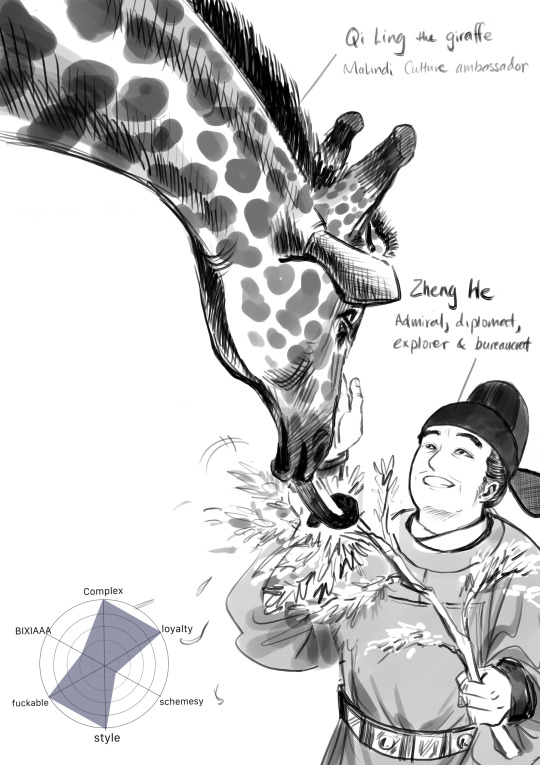
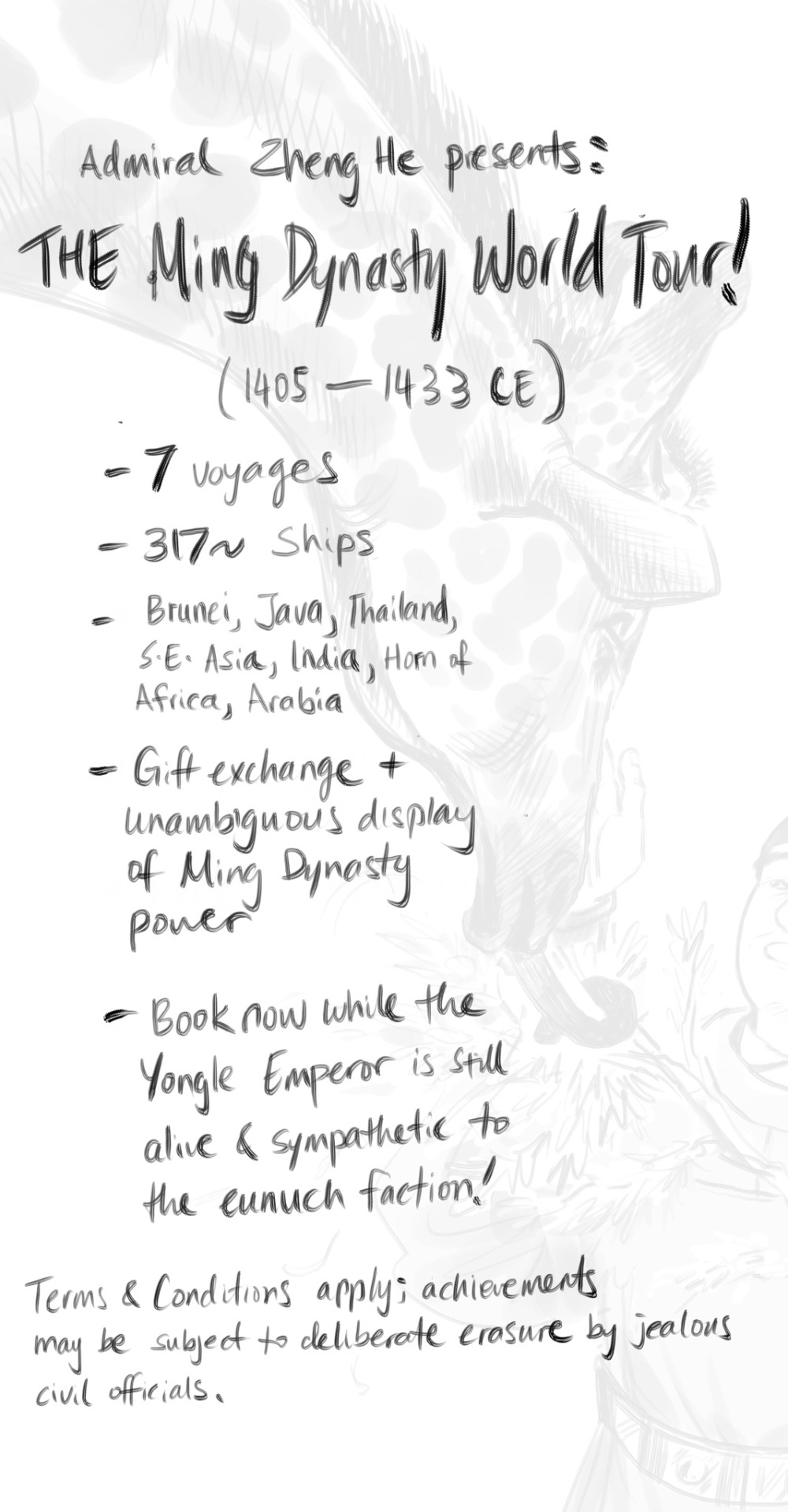
ming dynasty
MAKE SOME FUCKING NOISE FOR THE COOLEST PERSON IN THE MING DYNASTY!!!! actually scratch that, MAKE SOME FUCKING NOISE FOR THE COOLEST PERSON IN CHINESE HISTORY, PERIOD.
Zheng He was born Ma He to muslims living in Yunan, which was ruled by Mongols at the time. He was captured by the Ming army between the age of 10-14, castrated, and given to the young Yongle Emperor as a servant. Incredibly enough, he was like "no hard feelings mate" and went on to work in EVERY SINGLE JOB. and kick absolute ass in ALL OF THEM. he started out as a soldier on the northern frontier (the toughest place to serve, that was where all the border conflicts were) and fought in several campaigns with the future emperor, distinguishing himself and earning the emperor's trust.
I originally had him drawn in a more stereotypically "heroic" pose, by all accounts he was a tough guy who "walked like a tiger", and while the main purpose of the Ming voyages were diplomatic, he didn't shy away from violence. (he fought PIRATES. like a fucking shonen protagonist). in the end i decided to go with a picture that showcases less celebrated but equally important leadership qualities like curiosity, patience and discipline. I also want to point out that he wasn't the only eunuch on the trip, around half of the commanding officers were also eunuchs. He wasn't an exception to the rule but rather the face of a largely ignored majority; complicated people who were making the most of a difficult job.
Notes: the giraffe he brought back didn't have a name (at least not on record), but the Ming thought it was a qilin (kinda like a chinese unicorn) and i thought that would be an adorable name for a giraffe.
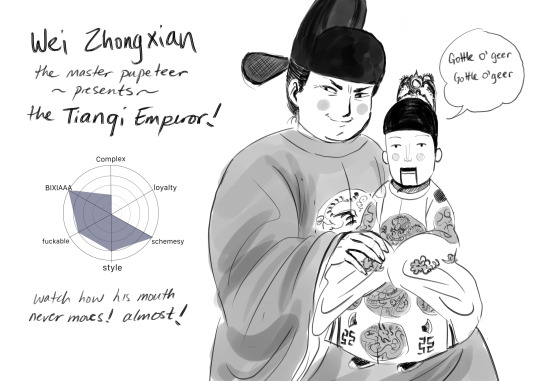
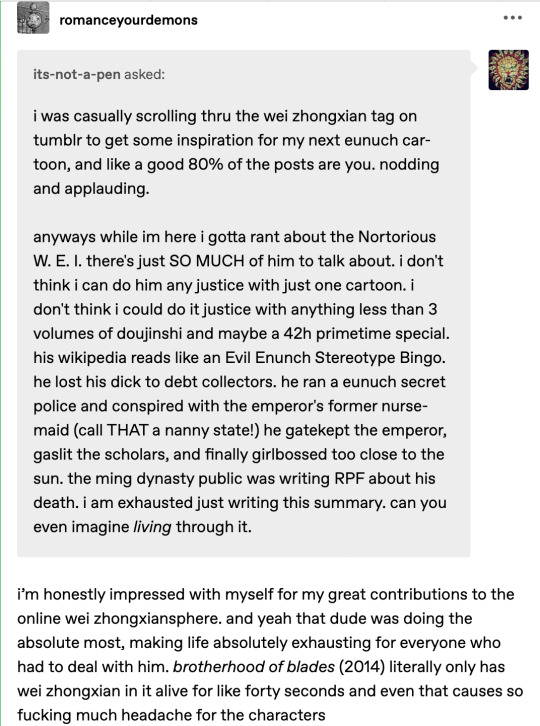
Ming Dynasty
i feel like we've had too much nuance, so lets finish this list off with a properly corrupt and scheming enunch! Wei Zhongxian castrated himself at age 21 to escape his gambling debts, and it unleashed his potiential like Rock Lee removing his leg weights. once inside the palace, he started out as a minor kitchen hand but managed to hustle his way to being the right hand of the emperor, who was an indifferent ruler that prefered woodworking to running a country. for this reason, I decided to make him a ventriloquist dummy.
Wei Zhongxian then proceeded to go on an extravagant and over-compensating ego trip. actually, it was more like a 40-year-long, olympic worthy, ego-long jump. things came to a terrible end when he tried to stage a coup (it failed and he decided not to hang around the capital, and go hang on some rafters instead). by then, decades of corruption had weakened the Ming, the emperor's only son got exploded in horrible incident that also wiped out most of the Ming Dynasty munitions--and what's this? here comes the Qing Dynasty with a steel chair!!!! notes: I decided to make Wei Zhongxian's design a human version of my cat, because he is also an incredibly devious but rather low-wisdom individial.
191 notes
·
View notes
Text
The Apothecary Diaries - LN 9, 10 Impressions
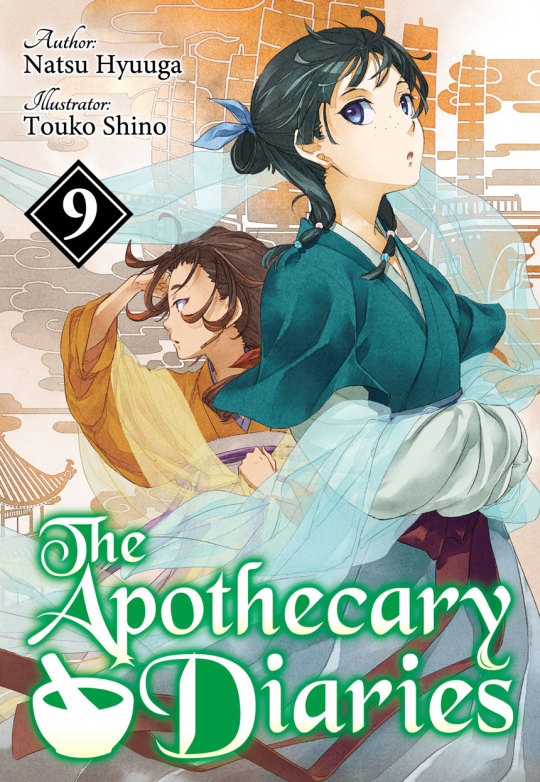
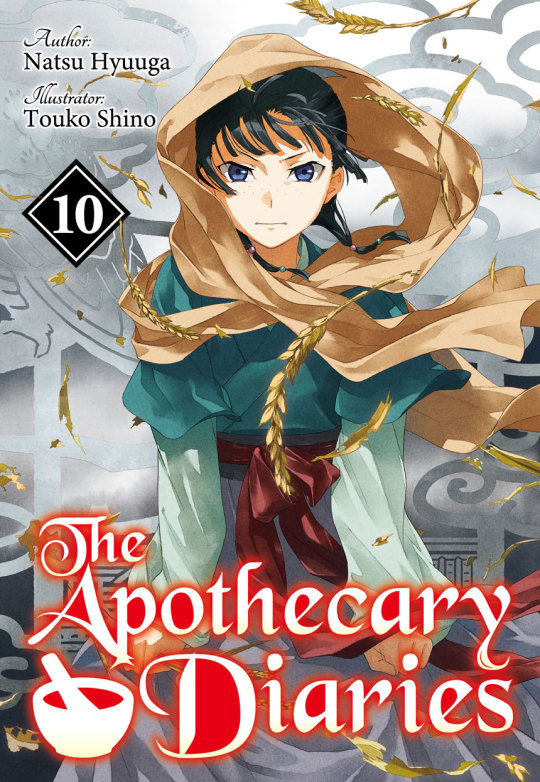
The Apothecary Diaries Volumes 9 and 10 by Natsu Hyuuga, Illustrations by Touko Shino. Published by J-Novel Club.
Volumes 9 and 10 kick off "Western Capital, part 2". There is a lot going on here politically since it is the region that Gyokuyou is from, and there are plenty of enemies with unknown motivations.
In Volume 9, Maomao has basically become Jinshi's personal doctor for [spoiler] reasons, so she must go though as much training as possible before they set off for I-sei province.
For those in the know, it's an open secret, but it puts Maomao in an even more precarious position, as there are no female doctors at all, due to the cultural stigma. This brings her into conflict with her peers, but she does her best to navigate it. Also, since this is at Jinshi's behest, and she is the daughter of Lakan and adopted daughter of Luomen, there's little that anyone can do to stop her. She has already proven that she has the skills, and now she has the motivation to study as hard as possible.
I liked learning about how even though doctors are revered, the training they have to go through is considered blasphemy, since they have to study corpses of animals and people through dissection. I really enjoy anything to do with medicine and biology, so it was super interesting to find out that the method of teaching is the same. Anatomy dissections are incredibly difficult since the structures are hard to identify (personal experience OTL), so the narrative introduces a proper foil to Maomao who has the same level of skills, but in surgery. Tianyu may be annoying, but he's the first peer of hers to be on the same level of knowledge in a related field, so Maomao's begrudging respect makes for an interesting dynamic between the two.
Volume 9 also contains their journey to I-sei, which includes some funny mysteries and side quests that I won't spoil here.
Volume 10 is basically all about farming and further political maneuvering. The narrative has been building towards an insect plague that they have to prepare for, and this book is all about their massive effort to save the province from famine.
They introduced a new character, "Lahan's Brother" who is a dispassionate but highly serious farmer. He's forced by Lahan to further the La clan's potato agenda, and unfortunately Maomao prevents anyone from ever knowing his name lmao. Poor Lahan's Brother, I hope we find out your name one day!
There's not a whole lot I can write about Volume 10 that wouldn't spoil the outcome of the plague plotline, but I CAN say that I liked the expansion and exploration of the side characters, including the Ma family. I've always been curious about Gaoshun's family, and this arc gives us plenty of screentime for Chue (wife of Gaoshun's 1st son, Baryou), Basen (Gaoshun's 2nd son), and even Taomei (Gaoshun's wife).
As always, it's a fun read, and I'll be sad when I catch up the most recent volume.
Dreamwidth mirror
21 notes
·
View notes
Text
✨THE RADIO DEMON✨
Name: Alistair Clémenceau
Species/Origin: Sinner, Deer Demon
Gender/Pronouns: Male, He/Him
Sexuality: Aromantic Asexual
Year of Birth: 1891
Year of Death: 1933
Appearance:

Personality:
Alistair is a charmer, he's extremely charismatic and extremely manipulative. He knows exactly how to get under people's skin - and how to get what he wants. He's grown quite cocky with all of the power he's obtained in Hell, but has no issues concealing it when necessary and adopting a more humble front. He often acts cheerfully while still never letting those around him forget what he's capable of, as one of the most powerful overlords in Hell. He doesn't make his intentions known, ever, he's a showman who uses theatricality to get his way. Literally unable to stop smiling, he hides his true emotions behind a mask of uncomfortable cheeriness and personability. He's very traditional, refusing to modernize throughout his 91 years in Hell and holding himself to standards of decency from the time and place in which he lived.
Backstory:
Alistair Clémenceau was born in 1891 into the world of New Orleans, Louisiana, with the oppressive structures of the Jim Crow South looming over it. His heritage was complicated: his mother was dark-skinned, descended from a free black family of pre-abolition times, and through happenstance found herself forced to raise her son alone. His white-passing Creole father washed his hands of the generations-internalized bias and did not want to risk his reputation in a relationship scorned by society. Alistair's mother was left to her own devices: fighting stigma as a single woman of color, she turned to sex work to support herself and her son. The quiet sacrifices of his mother hit Alistair deep, and he grew up with a lingering respect for her strength and kindness. Her struggles outlined his fierce independence, teaching him how to survive in a world that was almost consistently looking down on him and how to mask his anger and longing.
Alistair's mother did everything in her power to make his life the best possible. His mama was a fierce protector, working very hard to shield her son from the harsh judgments of the world. She instilled an early appreciation for performance in Alistair; she snuck him into theater houses, music halls, and later, jazz clubs.
Early on, he had discovered the magic of the radio—a medium that to him seemed to speak secrets into the air. He was transfixed by voices that traveled, invisible, across distance, binding people in one common experience. He loved the voice, dislocated from identity—some kind of anonymity, some sort of power he later would crave for himself. He had started playing with crude radios as a child, even putting on little "on-air" shows for the scant audience of his mother and neighborhood friends. His mother encouraged his talents, taking pride in his ambition, and while Alistair's dreams grew bigger than New Orleans, he treasured those early performances for the bond it created between them.
But as Alistair grew older, darker aspects of his personality would emerge. Life in the harsh South had taught him early that mercy could be a fatal weakness, and he had learned that lesson well as means of survival. He felt invisible, oppressed, and alienated, and soon nurtured an intense sense of disdain for this society that had condemned him and his mother. Somewhere in this churning inner landscape, a deadly predilection began to stir.
Alistair found his subcultural niche as a faceless radio voice under a pseudonym when he was a young adult. His voice then was his instrument to voice anything he would want to say, sans the constraint of his persona. Behind the melodious voice was a macabre secret: he began killing, channeling years of rage and pain into his twisted "hobby." Skilled in passing under the radar, those he killed were symbolic to him—representations of hypocrisy and cruelty, people he thought were more vile than himself—and never women. The longer this went on, the more he reveled in his crimes—both of flesh and of control. Thus, he became a cannibal, grotesque appetite not to be publicly displayed.
As Alistair descended into darkness, he found his companion in Madeline "Maisie" Auclair, a jazz singer and flapper. Maisie was one of the few individuals who actually saw both the charmer and the dangerous man beneath the mask; nights with her in smoky jazz clubs were an escape for Alistair. They bonded over their shared cynicism and humor, Maisie offering him an unusual kind of acceptance, even if she didn't fully understand the extent of his violent life.
But finally, the bloody double life of Alistair unraveled. In 1933, he was caught hiding a body; his elusive anonymity shattered in that second. He fled, but the police tracked him down, shooting him in the leg before unleashing dogs on him.
In Hell, a speaker implanted in his chest carries his voice, and he can revel in the theatrics that he so enjoyed in life. Hellproved to be fertile ground for his ambitions, and he rose through the ranks until his charisma and manipulations brought him to the status of an overlord feared by many. Clinging to an outdated sense of honor, he refused to change and cloaked his words in an unsettlingly charismatic air. And yet, still buried beneath the cynicism and the cruelties was respect for his mother's ferocity.
Lately, Alistair has been fascinated by the Prince of Hell and her plans for some kind of redemption project. That fascination may well be pure entertainment value or may mask something rather darker, but his eyes are upon her, and Alistair does little without a purpose in mind.
#hazbin hotel rewrite#anti hazbin hotel#anti vivziepop#hazbin hotel redesign#hazbin hotel critical#vivziepop critical#Alistair#heavenbound hotel#hbh characters
26 notes
·
View notes
Text
golden age dick grayson/robin and batman in the proper historical context, an analysis of rumored queercoding, guardianship, and adoption
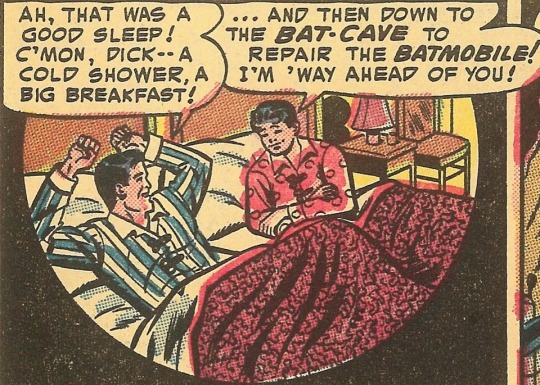
(not talking about live action media) the first thing i want to talk about is “queercoding” of golden age robin. i don’t believe he was queercoded at all, at least more than any other character back then. golden age cape comics were very campy! looking back on a lot of that we can see queercoded from modern context but that’s how pretty much everyone was written, especially post ww2. and no, sleeping in the same bed as your paternal figure is not gay.
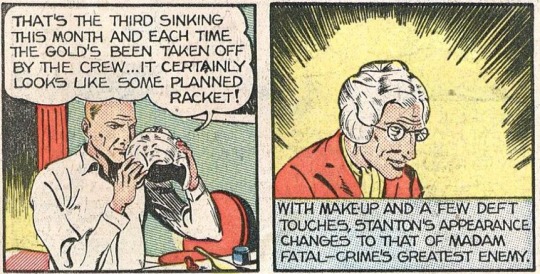

they were not changed to be familial post-cca either. batman didn’t adopt robin until 50 years after the cca was created. superhero comics did become much less able to be read as queer with the censorship (ex the introduction of aunt harriet in the batman mythos) but in batman and robin’s case this was often just stigma against single men taking in children, specifically boys.
i also feel there’s a misunderstanding with looking at wardship, foster care, and adoption in the 1940s (american) context. foster care only became extremely widespread around a year before the creation of robin (before that most kids were in institutions/orphanages) and looking back on batman and robin it is fascinating how extremely modern it was to have a single father taking in an orphan and treating him as a son, when parents taking in orphaned children was just becoming popularized due to ww2 plus studies about children needing empathy and other scandals and the depression slowly closing down orphanages.
it’s also a topic of debate why dick was written explicitly as a ward rather than a foster child because wardship as it’s written with dick is similar to modern foster care, and i’d like to share my perspective on this. foster care before 1945 was not really considered permanent and was still quite often perceived to be labour, specifically in farms out west. this stigma and the idea of it not being long term may have led to them instead using the, at the time very modern, concept of wardship for the child’s benefit. prior to 1935 (only 5 years before robin was created and referred to explicitly as a ward), wardship was not about the orphan, but someone being in charge of the orphans property.
in 1935 things majorly changed within the child welfare system, and wardship became completely different. it was changed to be centered around the child, with guardians supporting the child and acting in a parental role. from what i’ve gathered, the main difference between this and foster care was wardship was considered more long term.
data was largely not taken during 1930s/1940s for adoption, but it seems that it was almost always for babies. beliefs of eugenics were just growing less popular, but the belief that adopted children should be treated as biological and not know they were adopted rose to be extremely widespread and thought as fact. this was obviously impossible for a 7 year old, and i can find very little information on older children being adopted by people who weren’t related to them during this time-period.
plus bruce is a single parent, and a single man at that, who was taking in a child. adoption initiatives didn’t advertise to single parents at all until the 1960s, especially a man who isn’t related to the child biologically. it would’ve been odd to have dick as his adopted child, in contrast to the more relevant guardianship programs.
all in all golden age bruce wasn’t dick’s father but they were very familial and close. i went through a bunch of early batman for this and i don’t think their relationship was queercoded. these comics are 80 years old and historical media needs to be consumed with that in mind.
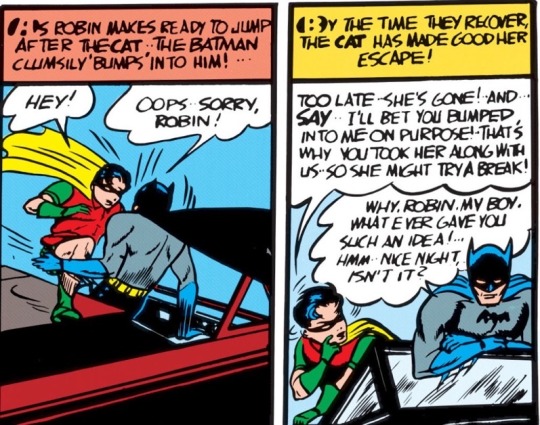
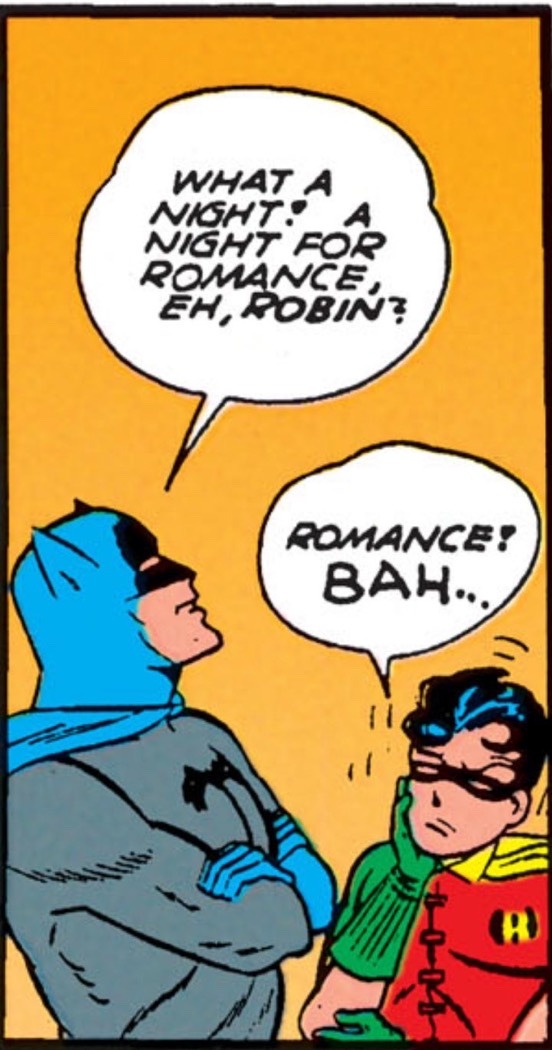
sources:
http://www.nccwe.org/toolkits/guardianship/history.htm
https://pages.uoregon.edu/adoption/
https://www.repository.law.indiana.edu/cgi/viewcontent.cgi?article=2579&context=facpub
#dick grayson#dc robin#dc comics#comics#bruce wayne#batman#golden age comics#batfam#gotham city#media analysis#batman and robin
8 notes
·
View notes
Text
I noticed that in Hetalia, none of the nations ever claim the title of parent. Sure, they raise other nations, but almost always refer to themselves as older siblings. England and France adopted America and Canada as their younger brothers. Ditto for Prussia and England, who created Germany and Sealand; in Sealand's case, it's even self-proclaimed, since England doesn't acknowledge him. Spain calls himself South Italy's boss, and Ladonia calls Sweden by his first name.
It seems like the only nations with parental titles are the posthumous ones. Rome is the grandfather of the Italy brothers, Germania is the grandfather of the Germanic states, Ancient Greece and Ancient Egypt are the mothers of modern Greece and Egypt, etc.
So I have a headcanon that nations consider it taboo to refer to a living nation as a parent, to avoid the stigma of being a deceased predecessor state. Only if a nation dies is it allowed to call them a parent, or in some cases a daughter or son.
On a more practical note, it helps them hide from humans. It doesn't seem like vassal states were expected to grow into adults, but they were at least expected to grow into older children, and the age gap would eventually become unconvincing.
In some cases, it might not have worked even from the start. Spain and England appeared to be in their late teens when they took in Romano and America, with France maybe a little older. A generous onlooker might rationalize that the adults are older than they look and the children younger, leveling the age of parenthood at sixteen or so. But Sealand and Germany were born clearly looking around ten years old, and doing the math with England and Prussia in their early twenties would turn scandalous fast.
And then they'd have to explain who the mother is, why she's not in the picture, why the in-laws aren't taking care of the kid, and why they haven't remarried. The kid might appear to be illegitimate at worst. Easier to claim to be orphaned siblings.
12 notes
·
View notes
Text
Medalist Episode 6 Review - An Arduous Journey
This is a nice break episode for the next part of Inori and Tsukasa’s journey to become the best. It was finally nice to see Tsukasa’s backstory and see how he got into figure skating and his arduous journey.

It turns out that Tsukasa started figure skating at a late age, 14, and that nobody wanted to coach him because of that. Instead, he had to train on his own. His own parents were busy with his other siblings as he has a lot of them, so they couldn’t support him either. It was just him and the world when it came to figure skating. There was a family who was able to support him financially, which is the Kago family. The Kago family consists of Koichi, Meiko, and their daughter Yo. Tsukasa is like their adopted son of sorts as they took him in as a teenager and supported his figure skating dreams. Because of their support, Tsukasa wanted to his best to make a name for himself, so he worked to become Hitomi’s ice dancer partner. His highest position was fourth in a big competition, but in a world where making podium only matters, it’s not very rewarding to him.






I can see why Tsukasa wants to coach Inori when he saw her as someone who cannot skate due to being forbidden to. I also like that he doesn’t try to live vicariously through her. He respects Inori as a person and also respects her boundaries and circumstances. If he had tried to live a vicarious life, he’d be an antagonist and not a protagonist; people love Tsukasa because he’s a protagonist.

I really love the message his backstory tells. The moral is that anyone can chase a passion at any age. There is a huge stigma when it comes to age. People always say that one is too old to do something and they’re not allowed to enjoy it anymore; I’ve seen in a lot in social media where young people insult older people for being in fandoms when it’s something that anyone at any age can enjoy. There is no expiration date for that. No, f*** that mindset. If you’re still breathing, you are capable of doing anything you want at any age. Heck, some people find their passions really late in their lives.

It really reminds me of myself in a way. I dreamt of being a writer ever since I was a teenager, but nothing I wrote ever got accepted for publication. There was also a time where I almost got a publication from a vanity press but chickened out last minute. Getting older, I learned that I don’t necessarily have to be a traditionally published author to be a writer. I can write anime reviews like this and even publish web novels and still be considered a writer. Heck, self-publishing and indie authors are on the rise these days. Like how Tsukasa isn’t an Olympic medalist, he’s still a figure skater, even if he only does ice shows or coaching. Even if there’s one person in the world reading my works, I’ll still be happy.

I also like how the backstory of how Inori was able to go to the skate rink in the first episode without pay. It turns out that Mr. Sekoma, the receptionist, felt sorry for Inori who wanted to skate so much so he told her that if she collects worms for birds, he’ll let use that as payment to let her in. I wonder if that’s the reason why she likes worms so much. Regardless, Mr. Sekoma really is the unsung hero of the story because he allowed Inori to go into the rink and because of that, Tsukasa was able to discover her talents.


I wonder what’s next for Inori and Tsukasa’s journey. Their next competition will be in Kyoto, so what will transpire? Will they meet new skaters and coaches and form a rivalry with them? Will Inori win first place? I can’t wait for Saturday to come! Let me know your thoughts on this episode!

#medalist#Inori yuitsuka#Tsukasa akeuraji#Hitomi takamine#Koichi kago#Meiko kago#yo kago#Manabu sekoma#review#anime#anime review#ecargmura#arum journal
7 notes
·
View notes
Text
Cursed Child is awful, but I really like Astoria and have enthusiastically adopted that version of her into my headcanons.
First of all, I like that she's a genuinely good person who was (most likely) a Slytherin. I'm totally here for interesting villains and morally gray characters, but there's something very irritating about the way Slytherin is consistently the "evil" house in canon, as if 25% of the student body can be reliably identified as bad people from the age of eleven. Astoria is one of the few exceptions and feels like a breath of fresh air. She can be kind-hearted, loving, and non-prejudiced and still be a Slytherin, and I love that about her.
The blood curse is a pretty blatant example of fridging: Astoria is not meant to be important in her own right and is killed off to create angst for her husband and son, as well as to get her out of the way before the main plot gets started. But ignoring how it's handled in the play, I think the idea of the blood curse has a lot of interesting potential. The Greengrasses must have been in a very odd position, being part of the upper crust of pure-blood society and yet having their family's greatest weakness be a curse passed down from one of their ancestors, whether that is openly known or kept secret.
Astoria was raised with the same ideology as many Slytherins, in a family that was surely not still pure-blood by accident, but rejected that ideology and never looked back. That might have had a little bit to do with the curse and the weird position it likely placed her in, but I think it probably had more to do with the war.
Her experience was described on Pottermore as "similar (though less violent and frightening)" in comparison to Draco's, which I take to mean that she wasn't personally affected by the war. She was pure-blood, her parents weren't Death Eaters, and she was only fifteen or sixteen when it ended. She most likely flew under the radar and was left alone. And yet, she still came out of it believing in equality, unwilling to pass down bigoted ideas to the next generation.
To me, this suggests that she was a compassionate and empathetic person who was moved by seeing how harmful the ideology was to other people. Reading about all the awful stuff that was happening, hearing about the ways in which the war was affecting her classmates, witnessing the Carrows' cruelty even if she herself wasn't their target - although she was a bit too young to be involved in it personally, the war must have played a huge role in shaping how she sees the world.
Astoria is, above all else, a good mother. She and Draco raised Scorpius differently than how they were raised, and it shows. She taught him that Muggles are people deserving of his respect, she sent him off to school with sweets to share hoping it would help him make friends, she encouraged him to be kind and generous rather than trying to mold him into a snob or a bully. And, it's strongly implied, she helped him make sense of his family's past, especially his father's ("Mum always told me that you were a better man than I could see" - CC Act 3 Scene 3).
What really breaks my heart, more than the blood curse, is what a lonely life Astoria seems to have led as an adult. She clearly had a loving relationship with Draco and Scorpius, but between her disapproving in-laws and the stigma of being connected to the Malfoys, her husband and son seem to have been all she had. Not only is she never mentioned having any friends as an adult (which could just be because she's out of focus), Scorpius obviously had a very isolated childhood, and the family is subjected to vicious rumors thanks to Rita Skeeter. Scorpius never even mentions his maternal grandparents or his aunt when he talks about his family. Did Astoria still have a relationship with them as an adult?
And yet, it was entirely her choice. She loved Draco, she saw (or perhaps brought out) the best in him, and so she married him. I love that their relationship isn't some sort of arranged marriage or strategic match based on blood status. That they do genuinely love each other and are willing to be together even though it's not the easy choice. Even though his parents disapprove, even though she will be judged and scrutinized in a way she has done nothing to deserve, even though there is no promise of a happy ending where they grow old together.
It's weird, because Astoria is only mentioned once in the books and gets absolutely zero characterization. She comes almost entirely from the play, most of which I reject; the trolley witch is an ordinary person, and Cedric Diggory would never join the Death Eaters 🤣. And I don't really love how she was dealt with in the play, never appearing onstage, killed off without ever being properly introduced. But from the little fragments of her story that we get and the implications of what we're told, I find her to be a really interesting character.
50 notes
·
View notes
Text
The trouble with trying to write stuff about Emmrich’s early childhood is that canon didn’t give us much, so now I’m inventing background for Rupert and Elannora Volkarin, plus several characters from the village he grew up in and their personalities and conflicts. This is supposed to be about baby Emmrich’s trauma, and I’m getting carried away making up small town drama.
(Elannora was actually from a fairly wealthy merchant family, and caused a massive scandal by falling in love with a lowly butcher and running away with him. She was well educated and still retained some posh speaking habits and manners even though she was living a much more humble life. Emmrich learned a lot of etiquette from the Necropolis, but he already had very good manners and a better vocabulary than one would expect of the child of peasants. That was all his mom’s influence.)
(Rupert was from several generations of butchers, and despite the stigma in Nevarra, he was proud of his work. He was more specialized in producing leather and parchment than meat, although he did sell most of the meat to Orlais, as their village was near the border. The ring he gave to Emmrich was a family heirloom that had been passed from father to son for the past four generations.)
(Emmrich didn’t really have friends his age, as being the son of a butcher was a bullyable offense. If asked, as of age eight, he would have said his friends were Lucy (the neighbor’s pig,) the neighbor who owned Lucy and was something of a doting auntie to him, and the villager librarian, who appreciated a child who loved to learn despite the meager offerings of their little library. Either of those adults would have offered to adopt Emmrich after his parents died, but since his magic manifested during the accident and some fucking narc told the local Chantry about it, that was not an option.)
17 notes
·
View notes
Note
Hi, there are a couple of things I wanted clarification on, if that's ok?:
"Neifile is to be wed to Ser Peter Champion shortly," he continues, "and all her children will be of House Champion."
Isn't Peter a 2nd son, can't he marry into the Merivale family instead? Especially since he has plenty of siblings, why is it necessary for Neifile to take the Champion name?
The onus of the burden is on having the having a child, the MC is rich, influential and, by the time they are considering children, married to another rich influential powerful person hence they have options that others wouldn't. Surrogacy and adoption are one of them although both are just inconvenient since you would have to pretend to be pregnant for about 9 months as a female MC.
I'm confused, if surrogacy and adoption are options for the heir, then why is it such a big deal that Garland is infertile? That scene comes across like an heir that is blood related is necessary.
Thank you for your questions! This is a great opportunity to clarify some of the customs and dynamics at play.
1. While Peter is indeed a second son, the tradition in this setting dictates that rank is determined by a combination of factors. Since neither Peter nor Neifile are the firstborn of their respective houses, the decision would default to comparing the status of their families as a whole. Both the Merivales and the Champions are Great Houses, meaning they hold comparable influence. From there, custom shifts to gender as the deciding factor—traditionally, a wife joins her husband’s house unless there is a compelling reason otherwise.
In this case, Peter being male gives House Champion the higher rank by custom, meaning Neifile would join his house.
However, a simpler and perhaps more decisive factor lies in their marriage contract. Peter’s grandfather, as the traditionalist and the current Lord Paramount of House Champion and the Borderlands, would likely insist that any grandchildren from the union belong firmly to his house. He wields significant influence, even over Peter’s father, and it’s easy to imagine this stipulation being non-negotiable during the marriage arrangements.
So while the custom provides a logical framework, the personal preferences of Lord Champion likely cemented the decision. I hope this clears up the reasoning.
2. Under the Inheritance Act of 329, Garland’s infertility disqualifies him from inheriting the Paramountcy of the Vale and Great Lakes. While surrogacy and adoption are options available to the MC (who operates in a different era with more resources and social capital) because they are technically fertile, they weren’t legally recognized when the Act was established.
Although the current timeline is in the year 439, the article of the Inheritance Act pertaining to impotence has neither been repealed nor amended, meaning its outdated stipulations still apply. Thus, Garland had to be disinherited.
Beyond the legal framework, Garland’s circumstances made his disinheritance almost inevitable. As a disabled man with mobility challenges, Garland already faced considerable stigma, which limited his marriage prospects and complicated his role as heir. His infertility compounded these issues, leading to overwhelming societal pressure on both Garland and his parents to name a more "suitable" heir.
In short, while modern options like surrogacy or adoption might have been a workaround for someone in the MC’s position, Garland’s disinheritance was driven by both legal constraints and entrenched social biases of the time.
I hope that clarifies things!
19 notes
·
View notes
Text
About this blog
Hi everyone! 💜
This is an ask blog for my modern omegaverse Patrochilles AU, which I’m currently writing on AO3 (Link!). Questions will be answered with art and/or text! My name is Angie (25 || she/her), and you can find me over on my main blog @darlingfreddie or my art blog @darlingsart where I’ll be posting art for this AU and my other AU + other random drawings/doodles.
This AU follows Patroclus and Achilles’ lives after meeting at a party and getting together a few months later. In this AU, Achilles is a famous musician, the lead singer of a band named Arete where his bandmates are Odysseus, Diomedes, and his cousin Ajax (referred to as AJ!). Patroclus is on the road to becoming a trauma surgeon and currently working on his fellowship program. Together, they’re navigating their hectic careers, family life, paparazzi, and everything else while being madly in love.
The About Page will be updated accordingly!
FAQ:
What are their secondary genders?: Achilles is an omega and Patroclus is an alpha.
How does this omegaverse work?: So, I've made this AU by pulling a number of ideas from different fics and resources since this is my first time handling omegaverse! Alpha/Beta/Omega dynamics in this AU are more non-traditional than in some other AUs, alphas are frequently in relationships with other alphas, omegas with other omegas, etc. I'd like to think that there aren't any rules or much stigma around that.
How old are they?: Currently, Achilles is 28 and Patroclus is 29.
How long have they been together?: About about five years. They are currently married.
Family members?: Achilles has a close relationship with his father, Peleus and is currently mending his relationship with his mother Thetis. Patroclus is very close with his adoptive father, Chiron. They also have one son, Max.
Friends?: They share a mutual group of friends including Odysseus, Diomedes, AJ, Penelope, Briseis, and Automedon (referred to as Auto!). Patroclus is closest to Briseis and Achilles is closest to Penelope. Achilles is also friends with Helen, a movie actress he met a few years ago.
Education?: Patroclus is currently completing his fellowship training and Achilles left high school before he could finish.
—This list will be updated as questions are answered/fics are written!—
28 notes
·
View notes
Text
I've been looking for more sources on historical homosexuality, so we're going to China first for context on Meijiu and Wang. very informal post that will get an in-depth follow-up when I read more sources about the era the story is set in
The homosexual tradition in China was largely censored as antiquated by the Self-Strengthening Movement, when homophobia was imported to China along with Western science and philosophy.
this was 1861–1895 so a generation before Wang
hey take this book (Obsession: Male Same-Sex Relations in China, 1900-1950) a quote from it:
From the 1920s to the 1930s, a group of writers in China’s major urban areas linked the issue of same-sex relations to the question of national survival. Their venues were major tabloid newspapers such as Crystal (Jingbao, 晶报) in Shanghai. In their writings, discussion of same-sex relations, whether between wayward women, male politicians and their male favorites, Chinese and foreign men, or in the form of male prostitution, became the means through which they expressed their anxieties over the well-being of the nation.
now back to me scrolling this wiki page
Ming dynasty China banned homosexual sodomy (anal sex) in the Ming Code since the Jiajing emperor's reign and continued into the Qing dynasty until 1907, when western influence led to the law being repealed. The Chinese mocked and insulted Puyi and the Japanese as homosexuals and presented it as proof of their perversion and being uncivilized.
now I'll go way back, since the gds are in part styled in an ancient historical way, to some of these homosexual traditions, starting with the Zhou dynasty and jumping around a lot to add into the social context of these characters now
I'll have to look through the sources on the western influence here since elsewhere in this article and when we get to Japan later, western influences are associated with more homophobia
The aristocratic poet Yu Xin (513-581) was representative of the more subtle system of patronage which existed without the stigma of prostitution, whereby a poorer or younger man could provide sexual service to a more established man in return for political advancement. Yu Xin opened his home and provided a standing reference for the younger Wang Shao, who repaid him by serving as a sort of butler and sex provider. Wang Shao went on to become an official censor.
sounds familiar
After the Song dynasty, homosexual behavior was most documented amongst the gentry and merchant classes, since these were the people who were doing most of the writing. Practically all officials of this class maintained a wife or wives to produce heirs, and used their economic advantage to engage in relationships, heterosexual and homosexual, which gave them unequal power. Thus documentation focuses on male courtesans or "singing boys" in luxurious but decadent surroundings who must take on a female role to please wealthy patrons intent on maintaining their role as the masculine partner in the agreement.
(we'll also see this in Japan later)
Although the province of Fujian was not alone in open homosexuality in the 17th century, it was the site of a unique system of male marriages, attested to by the scholar-bureaucrat Shen Defu and the writer Li Yu, and mythologized by in the folk tale, The Leveret Spirit. The older man in the union would play the masculine role as a qixiong or "adoptive older brother", paying a "bride price" to the family of the younger man- it was said virgins fetched higher prices- who became the qidi, or "adoptive younger brother". Li Yu described the ceremony, "They do not skip the three cups of tea or the six wedding rituals- it is just like a proper marriage with a formal wedding." The qidi then moved into the household of the qixiong, where he would be completely dependent on him, be treated as a son-in-law by the qixiongs parents, and possibly even help raise children adopted by the qixiong. These marriages could last as long as 20 years before both men were expected to marry women in order to procreate.
note how the relations are framed. the eventual expectations to marry women is also seen in the interaction between Wang and Richard you know the one. this in part (though the proposal comes later in the story) is why imo Meijiu's mysterious relatives in China may actually be Wang's family
A more individual example of a marriage-like relationship between men was that formed by the scholar-bureaucrat Bi Yuan 畢沅 (1730–1797) and the Suzhou actor Li Guiguan. The two men exchanged vows of fidelity, and Li Guiguan retired from the stage to be addressed by acquaintances as Bi's wife. Unlike the Fujian marriages, this was a unique relationship in its locality, so much so that it was still remembered 200 years later, when it inspired the novel Precious Mirror of Ranking Flowers by Chen Sen.
By 1655, Qing courts began to use the term jījiān (雞姦) for homosexual anal intercourse. Society began to emphasise strict obedience to the social order, which referred to a relationship between husband and wife. In 1740, an anti-homosexual decree was promulgated, defining voluntarily homosexual intercourse between adults as illegal. Though there were no records on the effectiveness of this decree, it was the first time homosexuality had been subject to legal proscription in China. The punishment, which included a month in prison and 100 heavy blows with heavy bamboo, was actually the lightest punishment which existed in the Qing legal system.
In 1912, the Xinhai Revolution toppled the Qing dynasty and its explicit prohibition of ji jian was abolished by the succeeding states.
and we're back in the 20th century...
I will be reading the book I linked so this here is just the idea of a post but I hope it's interesting
#this has quotes and all (nothing but quotes really) but don't expect much in depth yet#rgd posting#auau original
2 notes
·
View notes
Note
you wrote that you were making your Ares "not the best." what else is he "not the best at"?
/// Hello. first, I'll briefly discuss the reason for Making Ares "not the best": in order to avoid cliches and Marty Sue, in order to make the image closer to human (more on that later), as well as flaws add motivation and depth to the character, this is the ground with which you can develop the character and the situation.
for example: "not the best" is a stigma on the pride of the son of the supreme gods, which leads to his famous stubbornness and stubbornness, because pride does not allow him not to try to become like that.(tempering character). that is, the vulnerability of the image armor, coupled with pride and comparing oneself with others, leads the character to take some action. the reaction and response to these actions already depend it depends on the temperament and personality. Anyway, I hope I was able to get the idea across.
rconnection with humanity: Ares is more connected with society and sociality , he is literally inside socio-psychological connections and motives. is it possible to say that Athena is also connected?-yes, but it is more related to the objective, "cold", when Ares is more related to the subjective, with vivid emotions, + he is a reflection of the "bad" sides of the war- vivid emotions, rage, love for the motherland and the desire to protect, to the mud of the trench, to the horrors of war. this does not mean that he does not have an objective "smart" side, on the contrary, in order to be a god, and even wars, and even to occupy a place on the Council, you need to be at least a genius(that is, he is objectively smart, it is unlikely that Zeus would have allowed "non-" geniuses in his work to any real power) but, again, he is considered "not the most" even there, desperately wishing that there was only a cold Strategy in the war. but, he is not removed from the council, he is not thrown into tartarus. this is a triumph of recognition that the ideal of pure reason is unattainable, because then it will not be a living being, but a Hephaestus robot. and who is "imperfect", social, and more than capable of doing both reasonable and emotional things? that's right, man, a mockery of the gods, as the gods believed when Prometheus molded a new species from clay, but for some reason, people, like Ares, (although both have obvious flaws) were not removed.
here is such a small introduction turned out. Now let's move on to the answer itself.
not ideal in :growth, success, ideal image, following general rules, temperament control, the title of the firstborn (I adhere to the version that Hephaestus is the firstborn), not the most powerful physique, unpopularity,-!perhaps!- lack of those skills that were adopted to "maintain light small talk"
iIf you have any suggestions for developing this list or developing the depth of the character, I will be happy to listen to you.//
#ares rp#ares#pjo#incorrect greek gods#zeus#apollo#greek gods#hephaestus#poseidon#ares hades#epic the musical#epic the ithaca saga#epic musical#epic ares#ares fortnite#ares god of war#greek goddesses
4 notes
·
View notes
Note
Hypothetically if Spider ever managed to get an avatar and maybe it even eventually becomes his actual permanent body, do you think it’d change his relationship with the Sully family? Or is he forever doomed to be seen as a stray cat they care about kind of (when it’s not inconvenient) from time to time?
Thoughts on Spider.
After Way of the Water? No.
(Also, anon, why would you come to this blog for validation of family feels and hurt comfort? May I suggest you go to any other blog on this site, you'll be much happier.)
Because it'll come out that he brought the enemy to their camp as well as saved the corporal's life. Now, the former can be excused in that he was coerced and tortured. However, there is the messy emotional business that Neteyan died solely because of Quaritch's blind obsession with Jake Sully that Spider went out of his way to aid by showing him things they would not have considered such as flying banshees.
(Note, Spider was in a bad position, and more is a boy who just wants to be loved by somebody. This was his father who was finally noticing him, praising him, and of course while conflicted he wanted to aid him and have him be proud of him. He's also young and didn't realize that no, he's not clever enough to trick Quaritch and pretend to go along with his schemes then betray him at the last minute. That plan didn't work out.
What I'm getting at is I don't blame Spider by Neyteri certainly will.)
With Quaritch alive still and out for blood, when it gets out that Spider's the one who saved him (and it will get out), it'll seem to the Sully's that he picked sides and he didn't pick the Sully's. While I'm sure we'll have a whole thing about the kids forgiving him (Kiri especially is very fond of Spider in movie 2) and Jake telling Neyteri it's cool because "Sully's stick together" there's still not going to be great feeling after this.
I imagine, after a lot of hardship, Spider would be... tolerated at best and if possible, persuaded to go to Earth when they kick the humans out for the second time.
If they give him a consolation Avatar it'll be just that, a consolation Avatar, and I imagine he'll never remove the stigma of "other" from himself or "that time he cooperated with the enemy" (when, again, he had little choice in the matter).
Before the events of the second film, though, if an Avatar crash landed on him (or the lab had somehow managed to retain the materials to make them), I imagine Neyteri would find it weird and uncomfortable. Spider is human, in her eyes Jake had to prove himself a member of the people and effectively give up his humanity. Her children are her children, born of the Nav'i. Even Kiri is very clearly Nav'i and was born of immaculate conception (or let's not think about it). Spider has no reason to be in an Avatar, he's not fighting the humans who aren't there, and would just be doing it to... pretend he's Nav'i even more than the human scientists are. I imagine she wouldn't be thrilled, especially given it's the son of her enemy.
(I'm not saying this is rational of her, Spider is a child who literally knew nothing of any of these people, but it seems to be how Neyteri generally views him, and I don't see her loving the idea of adopting the son of her warlord enemy.
Given that, from what we see, she didn't love the idea of adopting the son of her warlord enemy in canon and kind of just let the socially awkward scientists not raise him.)
21 notes
·
View notes
Text
Fanfiction Ideas for Adoption
I have two ideas for DabiHawks fanfiction, but I'm pretty busy with other projects and my own as well as my studies, but I would still like to publish them: Both are free to use and interpret, as long as I'm mentioned in the credit, of course.
Fanfiction 1: "Falling for your secret identity" Set in an AU where Hawks and Dabi somehow swap roles and Hawks becomes the idealistic vigilante and Touya the burned out (pun intended) professional hero. Basically, the normal plot that all FFs give both of them with domestic fluff, magnetic attraction, etc. - but THE OTHER WAY AROUND. Keigo/Hawks Keigo is found and trained by the commission, but he runs away as a teenager (16? Younger? Shortly before his debut?) and has been active as a vigilante hero ever since (name can vary or remain "Hawks"): He is still an idealistic and optimistic sunny boy, but knows from his training as an assassin and spy that not everything that glitters is gold. He spends his everyday life as a simple internet journalist and conspiracy theorist blogger, where he passes on and collects his information (Shouto is his number 1 follower). When the well-known "League of Villains" and their dark-haired pyromaniac, who confuses Hawk's feelings, suddenly show interest in his work, Keigo is faced with the question of finally taking more drastic measures or continuing to pursue a dream. Touya/Dabi The storyline for Touya can vary (I'm not entirely sure myself and leave it up to the person writing to decide). Either Enji dies before Shouto is born, Rei gets an early divorce or Enji realizes his behavior, Touya is found by Shouto before Sekoto Peak burns or Touya burns but is still found by Endevour. In any case, the Todorokis are not so-so-broken (still a mess but more chilled). In any case, through hard work and effort (and lots of fire protection/cooling equipment), Touya has risen to become a professional hero, with the constant stigma of "Son of Endevour/Number Two" and even among the TOP 5 in Japan. However, he is always working and never gets a rest. For a few months now, he has been undercover in the league as the cremation villain "Dabi", but is starting to become more and more friendly with them. Now Tomura wants Dabi (Touya) to win the vigilante Hawks (Keigo) for the league.
Fanfiction 2: "Hawks Spite Playlist" Based on my personal and very dark headcanon that the commission "sells" the children who don't make it through the legacy program to the AFO orphanages. When Hawks finds this out (before he joins the league as a spy), he is finally done with the HPSC's shady dealings. He starts his own agenda against the commission and tries to get the league, the PLF and maybe even the UA on his side. And in doing so, he turns pretty much everyone's feelings upside down - especially Dabi's, who is more than impressed by the cynical and bloodthirsty ways of the golden boy Hawks.
#dabihawks#hotwings#mnhahawks#mnhadabi#mhnatouyatodoroki#mhnakeigotakami#fanfiction#writing#my hero academia#my hero academy fanfiction
3 notes
·
View notes
Note
Always been a girldad byler truther…but please broaden my mind tell me why I’m wrong
bsdkjfdbj feeling the #pressure rn, but it's just a Vibe that i feel in my heart and soul really.
boys are less likely than girls to get adopted and i think that's something that they (and the universe) would consider when expanding their family. having been lonely outcasts once, feeling unwanted and confused, and thus acting in ways that others couldn't always understand, i feel that their age-old refusal to stand by when recognizing that in others would jump out. they'd be able to relate in different ways and see themselves in a young boy that deserves everything they didn't get.
it's my hc that their first kid is one that's been through a few homes already, and that where others see a "flight risk," mike especially just sees his s2 self. this kid isn't standoffish—he's just afraid to let anyone in because he knows (read: fears) they'll leave again. he's not a problem child—he just craves attention of any kind, whether good or bad, because he never gets any. he's not a bad student—he's just never had anyone believe in him before and thus doesn't see the point. that kind of a thing.
people would write the kid off as a punk, but mike would recognize that that's just how he's learned to express and navigate his pain in a way that is considered acceptable for boys. no one ever heard his cry for help, but he hears this one and he's going to answer it.
hopefully that made sense. obviously this isn't a mike-only operation, nor is relatability or this trauma dependent on gender, but my point is they'd be in a unique position to break certain parenting cycles and do things for a young boy that people didn't do for them when they were his age.
i also enjoy the idea of them having a son as an incidental "fuck you" to the stigma of gay couples adopting same sex children. something about them being perfectly capable of raising a son, no matter what anyone has ever or would ever say, because there isn't a single thing about them that makes them unfit to do so. there will be no derision of whatever interests their son has or question of whether he's "man enough." it'd just be a man, his husband, and their son, all existing in harmony, trying every day to heal the wounds of the past together.
( until their daughter comes along eventually, bc i hc that, too, hehe. :3 )
#asks#power went out in the middle of me answering this the first time fml -_-#anyway. i jus have a lot of feelings abt byIer as parents and their little family <3#byler hc#byler#also i say husband bc i do think they'd have a private ceremony n stuff before it was legal. doesn't matter if it's not real to anyone else#bc it's real to them and that's enough :)#not rereading this behemoth of an ask i said wht i Said
32 notes
·
View notes